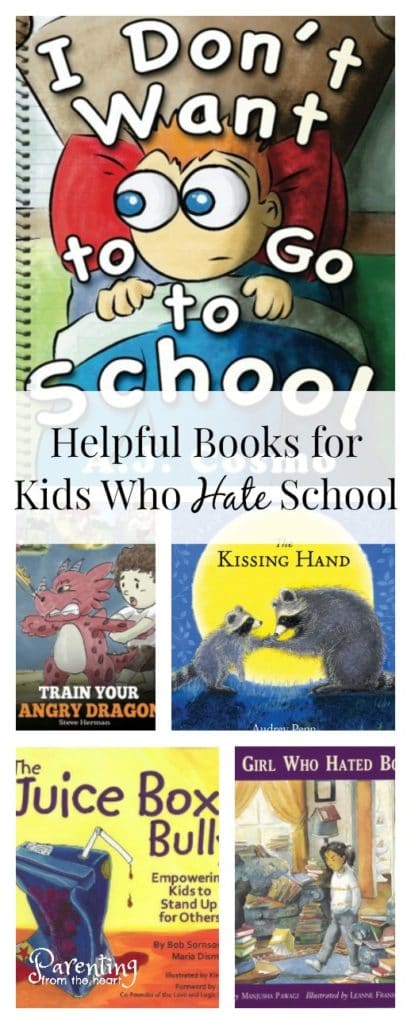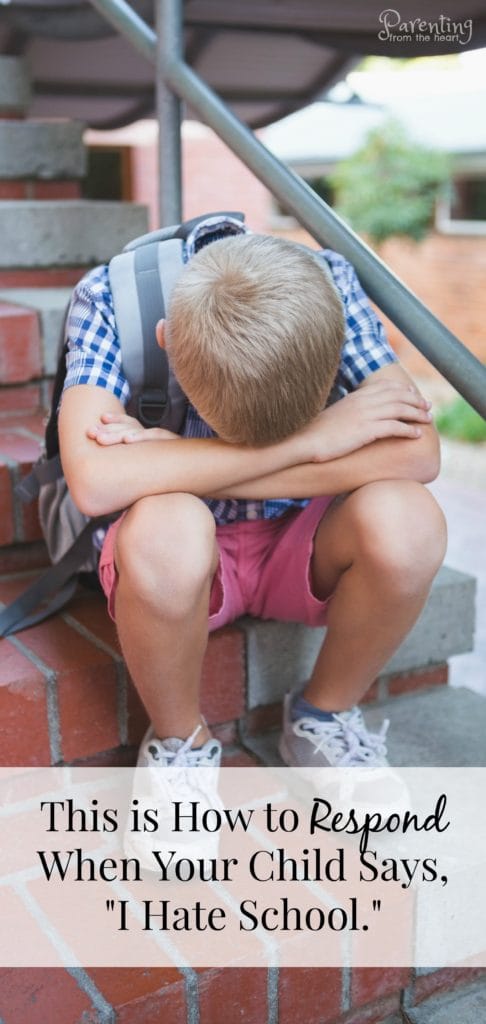Reasons for a 5 Year Old to Not Liking School
When your child starts to hate school, these strategies are crucial to support your child and ensure the greatest outcome with the school. Here you will find expert tips from parenting experts, a former school principal and university instructor as well as videos from a family therapist.
My six-year-old daughter wakes just before the crack of dawn talking all about her friends at school. Her big brown eyes sparkle as she chronicles the events of the day before.
"Did you know that for her birthday Abby got one of those massive LOLs?"
"At school, every day when I write my name I add a heart at the end. That way people know I signed it!"
"During lunch the other day, Lane pushed Charles. Lane got in trouble but I just think he was having a bad day."
She goes on and on with great enthusiasm.
My daughter was born ready to fly. The day I dropped her off at preschool I used loads of self-talk to keep from crying. I was fearful she'd miss or need me. She was elated to break out on her own. That day, she made her way through the oversized red school doors and didn't look back at.
It was the first of many days like this.
Kindergarten came and I worried about the duration of the day. Over six hours at school seemed like such a long time for a five-year-old to be away from home. But she came back from school energized recounting stories of her teacher's outrageous sense of humour and all the names of her BFFs. When her report card came, I poured over two pages that truly captivated who my daughter is. She loved school and was flourishing.
On weekends, she begged to be brought to school. When she was sick, I felt I was held emotionally hostage for keeping her from kindergarten.
She started first grade and it was business as usual for my eager student.
Little did I know we were weeks away from my daughter hating school…
The first time I thought there might be a problem was the day I volunteered to go to the pumpkin patch. We were ankle deep in mud amongst rows of orange and not-quite-ripe pumpkins. My daughter and the two girls from her class I was assigned rolled over each bright gourd looking for the perfect pumpkin for carving. That's when the smallest boy in my daughter's class decided to go rogue.
He broke away from the pack running.
By now, all of the pumpkin pickers were standing upright watching the teacher's pursuit of the breakaway child.

That's when it happened.
The teacher caught up to the child, grabbed both of his hands, knelt down to his level, shook his hands and sternly said. "No! We don't do that! Ever."
I anticipated discipline and coaching, not reactive anger. I was shocked.
But because my daughter was still happy at school, I didn't say anything to anyone. I shelved my feelings about the exchange and hoped for the best.
Slowly, my child who never wanted to miss school was asking for days off.
Then, she pleaded.
Her stories about school still featured her friends and accomplishments. Now she also describes instances of her teacher yelling and writing names on the chalkboard of kids who didn't listen with strikes beside their names.
One day, the fateful words I never thought I'd hear came.
"I hate school."
Even though there had been build-up to this moment, these three words were a punch to my gut. My precocious child had used the worst language she knew to describe how she felt.
I felt paralyzed. I wanted to support her and help solve the issue of hating school. But I didn't want to intensify the problem by making a mistake. I feared talking to the teacher would only put a target on her back. I didn't know what to do.
Related reading: Parenting a Strong-Willed Sensitive Child: This is what you need to know

This is how to respond when children hate school.
My mom, a former school principal who currently teaches in the Education Department at a local university, teamed with me to address this issue. Here is our best general advice based on my experience with positive parenting and her decades of educational experience.
Related reading: 11 Things Your Child's School Principal Would Like You to Know
Listen actively and respond to your child paraphrasing what she has said.
When our children use the word hate to describe someone or something, our knee-jerk reaction tends to be, "No, you don't." When we tell our children how to feel, their feelings become repressed and spill over as anger in other areas. Authors of How to Talk so Kids Will Listen & How to Listen so Kids Will Talk, Faber and Mazlish say the best course of action is to address even the harshest of words with empathy.
Avoid responses that repress like:
- "But you've always loved school,"
- "You'll get over it,"
- "All your friends are there," or
- "Don't say hate."
Instead, respond with understanding. This will help your child sort through his feelings faster. Examples include:
- "I can tell you're really upset. This is hard."
- "This must be frustrating. Can you tell me more?"or
- "You must have really felt ___, when___."
Listen until your child has fully expressed herself. Ask your child to draw or journal how she is feeling to get the release she needs and to give you a better understanding of how she feels.
Not only will she be able to get release from any emotions she has pent up, but you will also likely gain insights into the root of the issue.
Related reading: 5 tips for finding balance during crisis schooling and navigating our new normal

Encourage your child to journal, colour, or draw his or her feelings about school. This provides emotional release and can give you insight into his or her feelings
Use the magic want technique.
I learned this in counselling at university and it can work wonders for problem-solving. After you have listened to your child express his concerns, anger and fears. First, empathize. Then, ask him, if he had a magic wand to make going to and being at school better, what would he do? He may choose to fix friendships, have a better relationship with his teacher, or it could be something simple that makes him feel empowered.
When my son started crying when it was time to go to school, we used this technique. His magic wand request was that I woke up with him (I usually stayed in bed from when he woke at 6:30 until just after 7:00 a.m.). He also asked that my husband or I pack his backpack. Just these differences alone stopped months' worth of crying.
Avoid giving days off if you suspect the issue is separation anxiety or generalized anxiety.
Though a day off can provide a necessary reprieve, it can also create a negative feedback loop. If the child wants to avoid school, a day off with feed the desire to be away more. The one thing anxiety loves is avoidance. And, if the child has anxiety associated with school, missing school will essentially feed the anxiety and allow it to grow bigger.
Don't fan the flames. Stay positive when you express your opinions about the school and the teacher.
Empathy gives license for all of your child's negative emotions to come to the forefront. But we do this so that we can address the child's feelings so that they don't build up and become worse. Empathy should not be mistaken for adding fuel to the fire. In the case of empathy, the parent is acknowledging only what the child has said in different words. For instance, Child: "I hate school." Parent: "You're really angry. It's hard."
In contrast, fanning the flames would be the child saying, "I hate school." And the parent responding with, "I saw how rude your teacher was at the pumpkin patch. I don't like her either."
We must stay as positive as possible so our children feel empowered to handle their day-to-day interactions at school as best they can.
Read books about adversity and changing perspectives.
Stories help children generate a better understanding of their feelings and also make solutions seem more tangible.
Here are some recommended titles for grappling with not wanting to go to school.
I Don't Want to Go to School by A.J. Cosmo
The Juice Box Bully: Empowering Kids to Stand Up to Others by Bob Sorenson
The Girl Who Hated Books by Manjusha Pawagi
I Just Don't Like the Sound of No by Julia Cook
Train Your Angry Dragon: Teach Your Dragon to be Patient by Steve Herman
The Kissing Hand by Audrey Penn
Arrange an in-person meeting with the teacher to address your concerns.
In the case of my daughter, because I had witnessed the issue in the class, we skipped right to this step. When it didn't work out, we met with the school vice principal.
Email is great for little details or arranging the meeting. However, tone can easily be misconstrued and email tends to prompt a lot of back and forth. Set up a face-to-face meeting with the teacher.
When meeting with the teacher, remember that while your child's perceptions are completely valid, they are lacking context. Assume the best of the teacher and ask questions to generate a better understanding of what's going on. Approach the meeting with the intention of working as a team for the best outcome. This teacher will likely be your child's teacher until the end of the year. Giving the teacher the benefit of the doubt will make a resolution easier.
If all else fails, talk to the principal.
This should be used as a last resort after having met face to face with the teacher and is what we ultimately did. It may seem easier to avoid talking to the teacher about an issue in his class. However, most principals will ask that you meet with the teacher first. Meeting with the principal is where options such as switching classes can be discussed as well as more comprehensive solutions.
Fortunately, for us, this last step was the pivotal point. We came up with a plan that suited our family and, most importantly, our daughter. Moreover, the vice principal understood more of the issues in that class and was better equipped to deal with them.
There's hope.
After meeting with our school vice principal, we came up with a plan of attack that both addressed the issues in class and supported my daughter. Quite soon thereafter, there was an improvement. And since that school year, she has loved being at school.
A child's impression of school can last a lifetime. And, as such, it is so important that my children love to learn. If you suspect your child is being mistreated or struggling with school in any way, arrange meetings to generate a better understanding of what is going on. Each family is unique and each child's needs are different, no matter what you know what's best for your child.
There are affiliate links below. As an amazon associate, I earn from qualifying purchases.
For more great resources like this, check out:
5 tips for finding balance during crisis schooling and navigating our new normal
Parenting a Strong-Willed Sensitive Child: This is what you need to know
The Yes Brain Child: How to Cultivate Curiosity, Courage and Resilience in Your Child
After School Meltdowns: Why they happen and what you can do about them
10 Things Your Child's School Principal Would Like You to Know
School Principal Says Follow These 10 Tips for a Successful Start to Kindergarten
Are you anxious to go back to school? Watch this.


Reasons for a 5 Year Old to Not Liking School
Source: https://parentingfromtheheartblog.com/respond-hate-school/
0 Response to "Reasons for a 5 Year Old to Not Liking School"
Postar um comentário